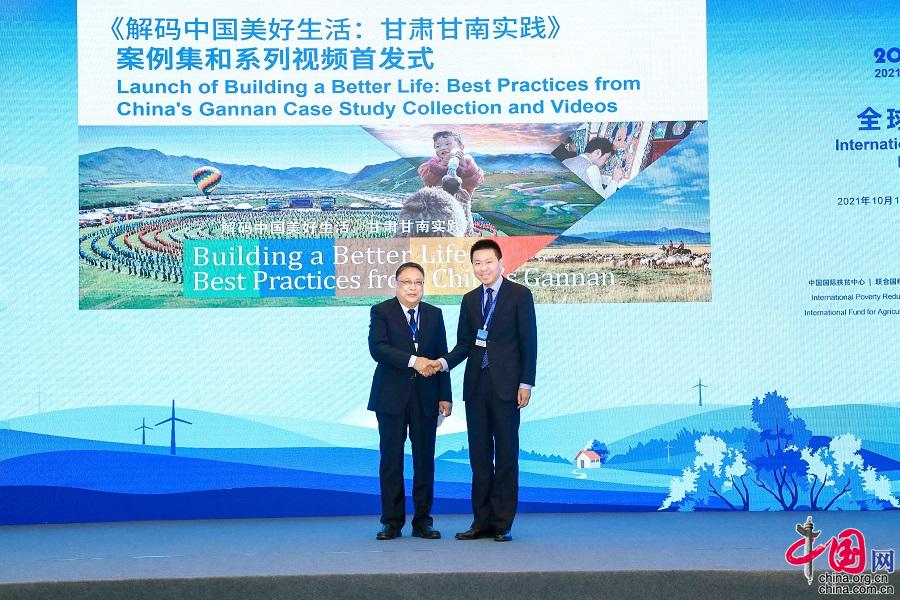On Oct. 19, a collection of case studies covering best poverty alleviation and rural development practices and a related video series collectively known as “Building a Better Life: Best Practices from China’s Gannan” were unveiled at the 2021 International Seminar on Global Poverty Reduction Partnerships in Beijing. The booklet and videos were co-produced by the Information Office of Gansu Provincial People’s Government and the Global Center on Development Knowledge Sharing – a newly established thinktank that operates under the supervision of the China International Publishing Group (CIPG).

A collection of case studies covering best poverty alleviation and rural development practices and a related video series collectively known as “Building a Better Life: Best Practices from China’s Gannan” are unveiled at the 2021 International Seminar on Global Poverty Reduction Partnerships in Beijing on Oct. 19. (Photo courtesy of IPRCC)
“The five case studies [in the collection] cover poverty reduction practices, education of ethnic minority groups, preservation and inheritance of traditional culture, environmental and ecological protection, and tourism development and tell development practitioners’ vivid stories,” Guo Jinshi, head of the Information Office of Gansu Provincial People’s Government, explained during the speech he gave at the event.
“The three videos cover topics, such as the yak husbandry industry, formerly impoverished Gaxiu village’s path out of poverty, and Xiahe county’s Thangka [a type of traditional Tibetan scrolling painting] town, from specific and professional angles and demonstrate the historical achievements that China has made as it builds a moderately prosperous society in all respects,” he added.
“I was really impressed to see all the great progress made in Gansu province, in Gannan,” FAO Representative to the People’s Republic of China Carlos Watson mentioned during an exclusive interview with China.org.cn. “There’s a Globally Important Agricultural Heritage Systems (GIAHS) site of a composite nature that combines agriculture, forestry and animal husbandry. This is a unique landscape that has been developed by local farmers to produce many crops in traditional forms. At the same time, it has [become] a great opportunity for improving livelihoods through tourism activities, for example.”
“You see, there’s a possibility for people to escape a little bit to the countryside and live a little bit of rural life,” he continued. “[They can] learn about rural and traditional methods and, at the same time, [support] the livelihood of local farmers. And, very importantly, it is very much in the heart of the GIAHS sites to promote the sustained practices of traditional methodologies and sites.”
“I wish the Gannan model can be replicated in places where conditions permit,” Watson added. “FAO is a great promoter of the GIAHS sites as a development mechanism. It is in line with the rural vitalization initiatives in China – they both have the same objective – so the marrying of these two initiatives is a great development, or a development tool that will enhance the lives of many people that live at the site that would benefit from having GIAHS actively involved.”
“Two subsidiaries of CIPG, the China Internet Information Center (CIIC) and the Academy of Contemporary China and World Studies (ACCWS), co-established the Global Center on Development Knowledge Sharing,” Zheng Wenhua, deputy Party secretary of CIIC, remarked. “The first products jointly produced by the organization and the Information Office of Gansu Provincial People’s Government, the English case study collection and video series were created in order to help the international community deepen their understanding of China’s poverty alleviation practices.”
The 2021 International Seminar on Global Poverty Reduction Partnerships was themed on “Post-COVID-19 Global Rural Development and Poverty Reduction: Innovations for Agri-Food Systems Transformation” and co-hosted by the Food and Agriculture Organization of the United Nations (FAO), International Fund for Agricultural Development (IFAD), World Food Programme (WFP), International Poverty Reduction Center in China (IPRCC) and CIIC.
(Jin Ling and Yang Xiaoxiao contributed to this story.)